×


We have detected your country as:
Please click here to go to the USA website or select another country from the dropdown list.
by: Dr. Bill Adams, National Field Director, Bridges for Peace
If Hebrews 11 can be called the biblical Hall of Faith, then a portion of that chapter could be subtitled the Hall of Faithful Warriors. Here we find a roster of Israel’s illustrious war heroes. But the writer faces a temporal dilemma as he seeks to present these men of renown:
“And what more shall I say? For the time would fail me to tell of Gideon and Barak and Samson and Jephthah, also of David and Samuel and the prophets”(Heb. 11:32).
Though “time would fail” the biblical author, let us steal some of the minutes he wished he had to examine the character and combat of these ancient military leaders. We’ll see that God embraced their weaknesses, as well as their strengths, in His strategy for redeeming the Land and people of Israel. We’ll learn from their faith-filled warfare that God accomplishes His righteous purpose on earth through those willing to fight for it.
I formerly led soldiers as an army officer; now I lead men in a Bridges for Peace tour over Israel’s ancient and modern battlefields. Walking rock-strewn, hallowed ground, my imagination carries me back to the dusty places and daring men the author of Hebrews is eager to tell us about. If only he had time to tell us their stories! Yet, we’re fortunate that the Hebrew Scriptures record Gideon, David and the others’ battlefield exploits. As we explore these accounts, we’ll glimpse the leadership of God’s liberators, gaining faith lessons from their successes, and their setbacks.

Photo: Flickr/IDF
The subject of warfare stirs up the conflicting emotions of defeat and victory, suffering and triumph, fear and courage. Wars arise because of the very worst in man. They are concluded by the very best in man. The terror assault this summer against the civilians of Israel is a classic example—the evil design of Hamas, which started the fighting, necessitated the noble sacrifice of the IDF [Israel Defense Force] to stop it. There is no moral equivalence; one side is devoted to death and destruction, the other to life and liberty. Such is the historic nature of the deadly contest over the Land of Israel.
In every conflict, it is leadership that makes the difference. The commander’s internal fortitude and personal ethic most often determine the outcome on the field of battle. God’s ancient, warrior-leaders were no exception, yet they did not rely so much on their own strength as on God’s. That’s called faith. The biblical Hall of Faith resounds with the maxim that acting in faith is essential in leading others in a way that is pleasing to God. And that’s called faithfulness.
Our biblical passage underscores that by faith God’s appointed leaders proved valiant in battle. It also tells us that by faith they escaped the sword. It appears we need faith when it’s time to stand and fight, and faith when it’s time to turn and run! By faith our heroes actively subdued kingdoms while they passively received promises. By faith the biblical warriors turned weakness into strength, revealing that they led out of the limitations common to all men, yet with the faith to overcome. Most important, by faith they put the “boots on the ground” necessary for God’s redemptive strategy for Israel. Consider the implications.
God sovereignly determined that His redemptive plan on earth would include securing a Land of His choosing. On this chosen Land, once called Canaan, He marshaled and trained a people to carry the message of redemption to the world. Now calling His Land the Land of Israel, God established His Torah [Gen.–Deut.] as the standard for civil order that all societies could emulate. Here He called forth prophets who declared all that would come to pass for those who would wisely obey, and those who would foolishly ignore, His orders. The prophets declared that in this place Messiah, the ultimate conqueror, would establish His righteous throne from which to rule the nations in strength and peace.
Have you ever wondered what would have happened to God’s redemptive strategy on earth if the Israelites had not secured the Land of Israel? While He could have accomplished His mission in any way He wanted, God linked the progress of His kingdom on earth to the conduct of His people in the Land. As a result, they had to conquer the Land.
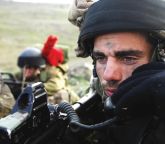
Photo by Ashernet
Military strategists know the only way to decisively win a war is to take and hold ground, denying the enemy further tactical use of it. God, the ultimate strategist, knew that His Land had to be taken and held for His purpose. Many Christians, by universalizing God’s chosen Land to mean the whole world, have missed the critical importance of Eretz Yisrael [Land of Israel] in God’s strategy to anchor His redemptive activity on earth. God’s strategy for world redemption necessitated chosen warriors conquering a chosen Land, by faith. Let’s now enter the Hall of Faithful Warriors and review the warriors honored there on the battle roster.
“By faith the walls of Jericho fell down after they were encircled for seven days. By faith the harlot Rahab did not perish with those who did not believe, when she had received the spies with peace. And what more shall I say? For the time would fail me to tell of Gideon and Barak and Samson and Jephthah, also of David and Samuel and the prophets: who through faith subdued kingdoms, worked righteousness, obtained promises, stopped the mouths of lions, quenched the violence of fire, escaped the edge of the sword, out of weakness were made strong, became valiant in battle, turned to flight the armies of the aliens” (Heb. 11:30–34).
Warrior: Rahab
Character Quality: LOYALTY
Scripture Reference: Joshua 6:25
“And Joshua spared Rahab the harlot, her father’s household, and all that she had. So she dwells in Israel to this day, because she hid the messengers whom Joshua sent to spy out Jericho.”
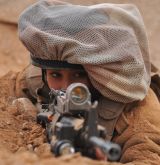
Photo by Shay Wagner/IDF/Flickr
The roster doesn’t start with a man of renown, but a woman! God upsets the male warrior mystique to remind us that by faith, not by man, the walls of Jericho came down. God even chose a woman of ill repute, an outcast, to be instrumental to His victory. Yet Hebrews 11:31 reveals that Rahab “believed” in the God of the Israelite scouts who sought refuge in her house. Upon hearing of the conquering power of the Israelites’ God, Rahab wisely shifted her allegiance from the false gods of the Canaanites to the one, true and living God of Abraham, Isaac and Jacob. This is the character quality of LOYALTY.
Rahab’s sanctified deed secured her, a Gentile, a place in the lineage of David and Yeshua [Jesus] of Nazareth. Just a paragraph into Mathew’s Gospel you’ll find Rahab listed in the genealogy. Yeshua’s brother, Yaacov [James] taught that God uses the outcasts of this world to accomplish His kingdom purpose: “Likewise, was not Rahab the harlot also justified by works when she received the messengers and sent them out another way?” (James 2:25).
Faith Lesson: Like Rahab, declare your LOYALTY to the God of Israel, joining the ranks of spiritual warriors who pray God’s will be done on earth, as it is in Heaven.
Warrior: Gideon
Character Quality: VALOR
Scripture Reference: Judges 6:12
“The Angel of the Lord appeared to him, and said to him, ‘The Lord is with you, you mighty man of valor!’”
What was Gideon doing when the angel declared him a “mighty man of valor?” He was hiding out in terror of the dreaded Midianite camel raiders! In concealment, he was threshing wheat in a wine press in the valley rather than at a threshing floor on the hilltop. This “mighty man of valor” thought himself the weakest man of the weakest tribe of the Israelites. Yet when the Lord’s messenger spoke courage into him, he rose to a level of undaunted valor and went forth to raise a mighty army to face the Midianite onslaught.
But God pared down Gideon’s army to a “by faith” band of brothers. On a dark and still night, this force of three hundred counter-insurgents carried out God’s tactical plan, complete with torches, shofars (ram’s horns) and shouting. They threw the slumbering marauders into fear and disarray to the point of slaying each other.
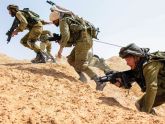
Photo: Flickr IDF
You may think the fight was over at that point, but not so. Judges 8:4 tells us, “When Gideon came to the Jordan, he and the three hundred men who were with him crossed over, exhausted but still in pursuit.” Under Gideon’s leadership, men who were completely spent pressed on over tens of kilometers through the Jordan Valley. Three hundred put thousands to flight, pursuing them over days to their destruction. This is the character quality of VALOR.
Faith Lesson: Like Gideon, rise to the level of authority God sees in you rather than what you see in yourself, you “mighty man of VALOR.”
Warrior: Barak
Character Quality: HUMILITY
Scripture Reference: Judges 4:6a-7
“Then she [Deborah] sent and called for Barak the son of Abinoam from Kedesh in Naphtali, and said to him, ‘Has not the Lord God of Israel commanded, “Go and deploy troops at Mount Tabor…against you I will deploy Sisera, the commander of Jabin’s army, with his chariots and his multitude at the River Kishon; and I will deliver him into your hand”?’”
On the battlefield tour, I asked the men why they thought Barak made the Hall of Faithful Warriors while the great warrior-judge, Deborah was not mentioned. Our Israeli guide piped up, “Because the Bible was written by men!” He may be right, but we who hold to biblical inspiration might hope it has more to do with the Holy Spirit pointing to something special about Deborah’s General.

Photo by Matanya/Flickr/IDF
When Deborah summoned Barak to campaign against the Canaanites, the military leader risked his career and reputation by insisting, “If you will go with me, then I will go; but if you will not go with me, I will not go!” (Judg. 4:8). Even though Deborah chided him that the glory for the victory would go to a woman, Barak set aside his male pride and acted with the wisdom of a man under authority. This is the character quality of HUMILITY.
Concluding this episode of exceptional mutual honor between two commanders, Deborah and Barak sang a duet: “When leaders lead in Israel; when the people willingly offer themselves, bless the Lord!” (Judg. 5:2). Both leaders acted out of an uncommon humility that empowered them to rally the Israelites to battle and secure the defeat of Jabin’s army in the Valley of Jezreel.
Faith Lesson: Like Barak, walk in HUMILITY under God’s appointed authorities for the advancement of His kingdom’s authority on earth.
Warrior: Samson
Character Quality: CONSECRATION
Scripture Reference: Judges 13:5
“For behold, you shall conceive and bear a son. And no razor shall come upon his head, for the child shall be a Nazirite to God from the womb; and he shall begin to deliver Israel out of the hands of the Philistines.”
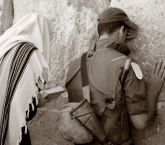
Photo: Flickr/IDF
Mighty Samson displayed the most individualistic, peculiar tactical leadership style ever seen on, or off, the battlefield. This was rooted in his boyhood and the Nazirite vow he grew up under. He was always different than the others, always having to prove himself by doing things his own, unorthodox way. But it was God who required the vow, for He required a fearless leader, wholly dedicated to mission accomplishment, who would infiltrate enemy lines to thwart the plans of the uncircumcised Philistines. This is the character quality of CONSECRATION.
The men on tour stood atop Tel Beit Shemesh, gazing out from the Sorek Valley onto the shimmering coastal plain, ancient stronghold of the Philistines. Painting the picture for us was Meir Malka of Beit Shemesh who invited us to look closely in hope that we might “see” the warrior-judge Samson lugging the gates of Gaza toward Hebron, neutralizing a thousand Philistines with a donkey jawbone, or igniting the fields and vineyards of the enemy with three hundred combustible foxes!
The group later spent time with soldiers of the Givati Brigade. These modern warriors defend Israel against Hamas and other terror factions that are entrenched in the very same Gaza corridor from which the ancient Philistines menaced Israel. Since Givati covers Samson’s area of operations, its insignia appropriately sports two foxes with a torch tied to their tails. Different enemy, same threat, and God still has consecrated, fearless fighters like Samson guarding His Land and people.
Faith Lesson: Like Samson, be willing to accept the most unlikely mission from God, in CONSECRATION to Him, by faith.
Warrior: Jephthah
Character Quality: READINESS
Scripture Reference: Judges 11:1
“Now Jephthah the Gileadite was a mighty man of valor, but he was the son of a harlot.”
Jephthah will be obscure to many, until they remember the father who sacrificed his own daughter. He may well have been a “mighty man of valor,” but this “son of a harlot” made a rash and terrible vow to sacrifice the first thing that came out of his door upon his return from victory in battle. When the young woman emerged from the house, Jephthah was hit with the horrific reality of what he had done. We might wonder how a man like this made the Hall of Faithful Warriors.
We should remember that every warrior-hero is also a human being with all the foibles we normal humans bear. Jephthah excelled early as a family defender but was rejected by his brothers who didn’t like him having a different mother. Yet, when they feared an Ammonite invasion, they called their brother back to fight for them. For all his social baggage, Jephthah remained confident, committed and ready to defend. This is the character quality of READINESS.
Our modern press brings us disappointing news of the moral failings in some of our most revered leaders. While we tend to get caught up in either accusing or excusing them, God is at work chastising and refining these leaders for future readiness. Jephthah reminds us of our unremitting need of accessing, by faith, God’s unmerited favor—His amazing grace.
Faith Lesson: Like Jephthah, access the grace of God and return to the place of faithful READINESS that pleases Him.
Warrior: David
Character Quality: PURSUIT
Scripture Reference: 1 Samuel 17:47–48
“Then David said, ‘… all this assembly shall know that the LORD does not save with sword and spear; for the battle is the LORD’s, and He will give you into our hands.’ So it was, when the Philistine arose and came and drew near to meet David, that David hurried and ran toward the army to meet the Philistine.”
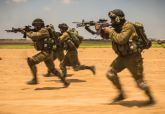
Photo by Matanya/Flickr/IDF
David grew up fending off lions, wolves, and bandits that wanted his sheep. At an early age, he acquired infantry (rod and staff) and field artillery (sling and stone) proficiencies. These war craft skills combined with a psalmist’s passion for God, readied him to fearlessly combat giants and generals while worshiping God with all his heart, mind and strength. As both commander and king, he led his people hard after God. This is the character quality of PURSUIT.
The conventional view of David is that he was the underdog when he faced Goliath in the Elah Valley. The men on the battlefield tour gained a more accurate perspective standing atop Tel Azeka, surveying the battle scene from the camp of the Philistines. Our Bible teacher pointed out that it was actually David who held the advantage over the giant. David’s speed, maneuverability, choice of weaponry, and faith made him the odds-on favorite against the pagan Philistine—and he knew it! That’s why he boldly “ran toward the army to meet the Philistine,” fully expecting to prevail.
Victory is not about size, but the inner drive to win. The modern Jewish army proves that, prevailing in battle through multiple wars intended for the annihilation of Israel by the combined Arab armies of the Middle East. Military experts have trouble explaining how tiny Israel has survived, much less thrived, over its sixty-six years of statehood. It’s the principle of pre-emption; “David” (Israel), though fighting defensively, knows he must charge at “Goliath” to thwart the enemy’s attack.
Faith Lesson: Like David, practice PURSUIT to destroy spiritual opposition, knowing that you already possess the advantage over evil.
Warrior: Samuel
Character Quality: DISCIPLINE
Scripture Reference: 1 Samuel 7:13
“So the Philistines were subdued, and they did not come anymore into the territory of Israel. And the hand of the Lord was against the Philistines all the days of Samuel.”
Not always strong and courageous, the children of Israel would grow fearful of the powerful Philistines. After the period of the Judges, a new kind of military leader emerged to serve and support the kings of Israel: the prophet-warrior. Chief among them was Samuel.

Photo by Shuval Nachum/IDF Spokesperson’s Unit/Flickr
We can liken the prophet-warriors to our military chaplains today who don’t bear arms but counsel and strengthen those who do. Like chaplains, Samuel and the prophets provided game-changing spiritual leadership to kings and commanders. They instilled biblical truth by living it before the troops. This is the character quality of DISCIPLINE.
Every good army runs on discipline. Chaplains infuse spiritual discipline into the ranks of the officers and soldiers. Chaplain Samuel modeled the spiritual disciplines of fasting, prayer and trusting the Lord so that he could exhort Israel’s armies to follow his example. When the archenemy fear began to grip them, the troops beseeched Samuel to cry out to the Lord to save them. Samuel, a spiritual warrior, stood in the gap and inspired the army to victory.
Faith Lesson: Like Samuel, employ spiritual DISCIPLINE, including worship, study, fasting and prayer on behalf of those who are losing the strength to fight.
God’s redemptive narrative is Jewish from beginning to end, but non-Jews play a strategic role too. Look carefully at God’s operational directive for Gentiles: “Rejoice, O Gentiles, with His people; for He will avenge the blood of His servants and render vengeance to His adversaries; He will provide atonement for His land and His people” (Deut. 32:43).
We, who are Gentiles (the Nations), are actually commanded to rejoice in what God accomplishes for His people (the Nation) on His Land. God promises that no matter what gains Israel’s enemies make, He will provide atonement, redeeming back what was lost. Indeed, countless usurpers have arisen, and the Land has had to be repeatedly reclaimed. While it is always God who conquers, it is always the children of Israel who must go in to possess it. That is why faithful warriors were needed centuries ago, and that is why Israel’s warriors are needed today. God’s Land is worth fighting for.
It shouldn’t surprise us that the Bible-believing Church has emerged as the primary Gentile ally of Israel in its modern restoration. While Israel commits her sons and daughters on the ground, Christians engage in the spiritual battle and aid the Jewish people as they come home. Christian assistance includes praying, providing tangible help, and speaking out in support of Israel. By faith, we “pray for the peace of Jerusalem” (Ps. 122:6) while laboring for the day when Israel will “learn war no more” (Isa. 2:4). But until the fullness of that time has come, we remain standing, by faith, with those who must defend Israel’s existence
Four thousand years ago, General Moses, Commander 1st Israelite Expeditionary Force, Sinai Campaign, anticipated Israel’s re-gathering that is now underway:
“The Lord your God will bring you back from captivity, and have compassion on you, and gather you again from all the nations where the Lord your God has scattered you. If any of you are driven out to the farthest parts under heaven, from there the Lord your God will gather you, and from there He will bring you. Then the Lord your God will bring you to the land which your fathers possessed, and you shall possess it” (Deut. 30:3–5).
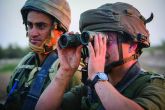
Photo: Flickr/IDF
After worldwide dispersion and near annihilation, the Jewish people have come back to the Land of their fathers. Arriving as the “dry bones” of Ezekiel 37:4, they have transformed into the “exceedingly great army” of Ezekiel 37:10. No wonder, for possessing the Land requires an army—a good army.
There’s no other plan: The Land of Israel will be in Israel’s possession when the fullness of God’s kingdom comes on earth. God will do it, and He will use His faithful warriors to get it done.
Dr. Bill Adams is a 1981 graduate of the United States Military Academy at West Point who served over a decade on active duty as a US Army Field Artillery officer, retiring in 2001 with the rank of Major, US Army Reserve.
Bar-Zohar, Michael, ed. Lionhearts: Heroes of Israel. New York: Warner Books, 1998.
Doughherty, Martin J. Battles of the Bible. New York: Metro Books, 2008.
Gladwell, Malcolm. David and Goliath: Underdogs, Misfits, and the Art of Battling Giants.
New York: Little Brown, 2013.
Goldman, Shalom. Zeal for Zion: Christians, Jews, & the Idea of The Promised Land.
Chapel Hill: The University of North Carolina Press, 2009.
Herzog, Chaim and Gichon, Mordechai. Battles of the Bible. New York: Fall River
Press, 2006.
All logos and trademarks in this site are property of their respective owner. All other materials are property of Bridges for Peace. Copyright © 2025.
Website Site Design by J-Town Internet Services Ltd. - Based in Jerusalem and Serving the World.